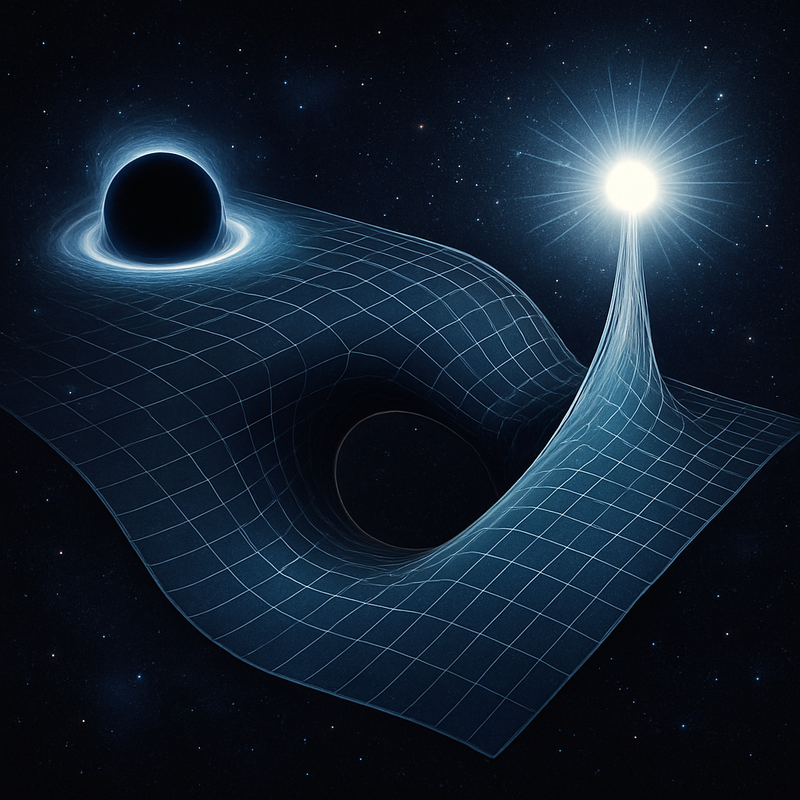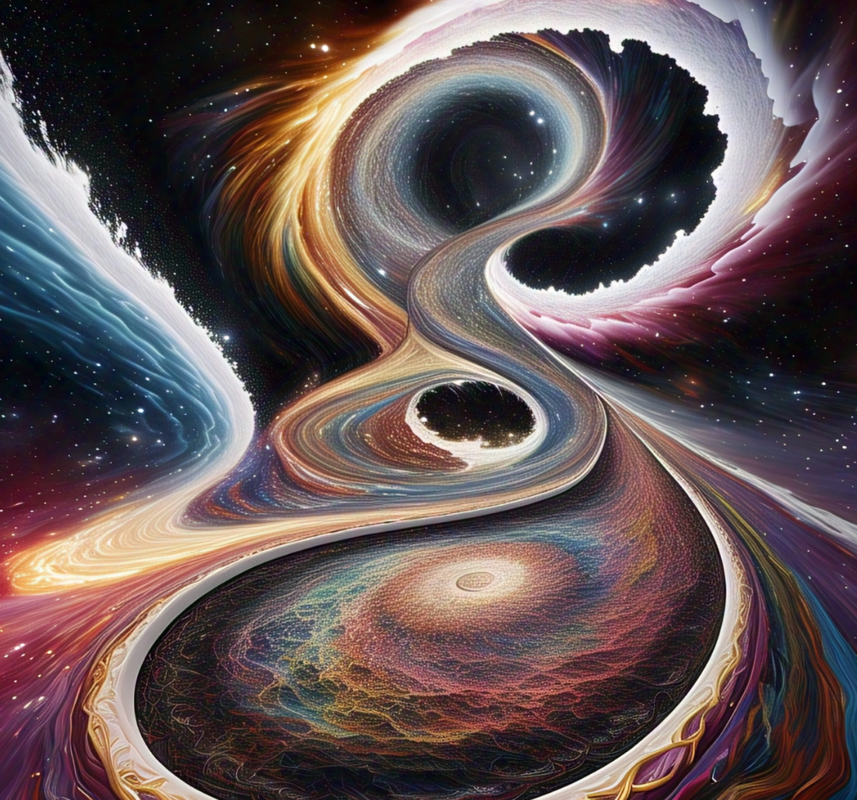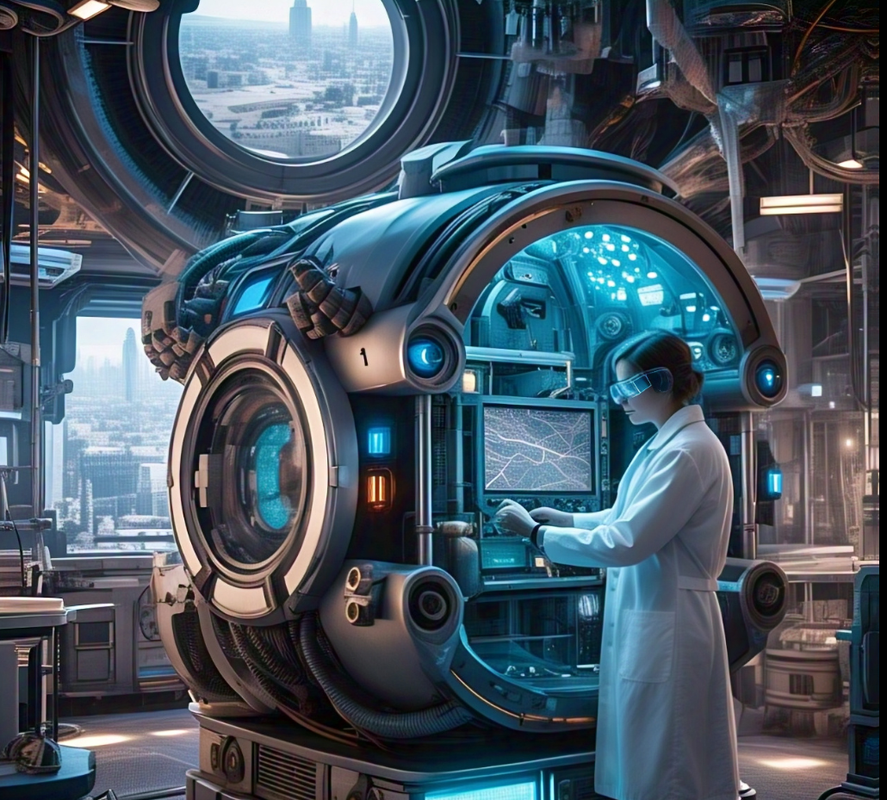Time Travel in Physics: Science Fiction or Future Reality?
Time Travel in Physics: Science Fiction or Future Reality?
Published on May 21, 2025 | Written by Science by Rao

Image: Conceptual representation of space-time, a fundamental element in time travel theories.
Introduction: Time travel has captivated the human imagination for centuries, featuring prominently in countless tales of science fiction. From H.G. Wells's "The Time Machine" to modern blockbusters, the idea of journeying through the past or future remains a powerful allure. But beyond the realm of fantasy, how much of this grand concept is truly rooted in the rigorous laws of modern physics? In this post, we'll delve into what contemporary science—particularly the groundbreaking theories of Albert Einstein and the enigmatic world of quantum mechanics—has to say about the very real, and often paradoxical, possibility of moving through time.
1. Einstein's Relativity and the Flexibility of Time
The notion that time is an absolute, unyielding constant was shattered by Albert Einstein's revolutionary theories of relativity. His **Special Theory of Relativity**, published in 1905, introduced the mind-bending concept that time is not universal but is relative to an observer's motion.
- Time Dilation: According to special relativity, time literally slows down for an object as its speed approaches the speed of light. This phenomenon, known as **time dilation**, means that an astronaut traveling at near-light speed would age slower than someone remaining on Earth. This isn't just theory; it has been rigorously confirmed by experiments involving atomic clocks on fast-moving jets and, crucially, on GPS satellites, which must account for time dilation to maintain their accuracy.
- Gravity and Time: Einstein's **General Theory of Relativity** (1915) further complicated matters by demonstrating that gravity also affects time. The stronger the gravitational field, the slower time passes. This means time moves slightly slower on Earth's surface than in orbit, and significantly slower near massive objects like black holes. In essence, both high speed and strong gravity can "bend" time, making travel to the future a proven, albeit impractical, reality.

Image: A conceptual model illustrating how relativity can affect the passage of time, leading to time dilation.
2. Wormholes: Cosmic Shortcuts Through Space-Time
Building on General Relativity, theoretical physicists have explored solutions that could potentially allow for more dramatic forms of time travel, including journeys into the past. One such intriguing concept is the **wormhole** (or Einstein-Rosen bridge).
- Hypothetical Bridges: Wormholes are hypothetical "shortcuts" or tunnels through the fabric of space-time, potentially connecting two distant points in space, or even two different points in time. Imagine folding a piece of paper and piercing a hole through it – a wormhole would be like that hole, connecting two points that are otherwise far apart.
- Challenges: However, the existence of stable, traversable wormholes remains purely speculative. Current theories suggest that if they exist, they would be incredibly unstable and require the presence of exotic matter with negative energy density to remain open – a type of matter that has not yet been observed. Furthermore, creating or manipulating such structures is currently far beyond our technological capabilities.
3. Quantum Mechanics and the Paradoxes of Time Loops
While relativity deals with the large-scale structure of space-time, **quantum mechanics** explores the universe at its smallest scales. Some interpretations of quantum physics and general relativity suggest that certain extreme conditions could allow for the formation of **Closed Timelike Curves (CTCs)**.
- Closed Timelike Curves (CTCs): A CTC is a theoretical path through space-time that loops back on itself, meaning an object or even information traveling along it could return to its own past. This concept directly implies the possibility of backward time travel.
- The Grandfather Paradox: The existence of CTCs immediately raises profound **paradoxes**, the most famous being the "grandfather paradox." If you could travel back in time and prevent your grandfather from meeting your grandmother, you would cease to exist, thereby making it impossible for you to go back in time in the first place. This self-contradictory loop challenges our fundamental understanding of causality and logic, leading many physicists to believe that CTCs (and thus backward time travel) might be forbidden by some as-yet-undiscovered law of physics.

Image: A quantum model, an abstract representation, hinting at the theoretical possibility of closed timelike curves (CTCs).
4. Is Time Travel Possible? Separating Fact from Fiction
Based on our current understanding of physics, we can delineate between different forms of time travel:
- Time Travel to the Future (Proven): This is not just possible but has been repeatedly observed and validated. Traveling at speeds close to light (as astronauts on the ISS do, albeit minimally) or experiencing strong gravitational fields will indeed result in you aging slower than those in a weaker gravitational field or moving slower relative to you. This is a real phenomenon, though it doesn't involve instantly jumping into a future year.
- Time Travel to the Past (Highly Speculative & Paradoxical): This is where science truly merges with science fiction. While theories like wormholes and CTCs provide some mathematical possibilities within General Relativity, their practical realization requires extreme conditions (like exotic matter) and leads to causality paradoxes that are difficult to resolve. Most physicists agree that backward time travel, if possible at all, would require immense technological and energy requirements—far, far beyond our current or foreseeable reach. Some theories propose mechanisms to avoid paradoxes (e.g., the Novikov self-consistency principle or parallel universes), but these are themselves highly speculative.
Conclusion: The Enduring Quest for Time's Secrets
While time travel remains a captivating theme in fiction, modern science, especially through the lens of Einstein's relativity, offers glimpses into real mechanisms that affect the passage of time. Forward time travel, though not in a conventional sci-fi sense of jumping centuries, is an established physical phenomenon. Backward time travel, however, pushes the very boundaries of our understanding, venturing into the realms of the purely theoretical and paradoxical. As physicists continue to explore the fundamental nature of space, time, and gravity, what seems impossible today may indeed become a reality tomorrow. The quest to understand time's deepest secrets is far from over, and it continues to inspire scientific inquiry at the cutting edge of human knowledge.
The odds of full-fledged time travel, especially to the past, remaining within our lifetime are exceptionally low, given the immense theoretical and technological hurdles. However, the scientific pursuit of such profound questions constantly pushes the boundaries of innovation and discovery. Stay curious—it’s the first step to any great scientific breakthrough.
Explore More Science by Rao:
- AI in Space Exploration: How Artificial Intelligence is Changing the Future of Space Missions
- AI in Warfare: How Artificial Intelligence is Revolutionizing Modern Battlefields
- The Moon as Earth’s Backup: Why Lunar Colonization Is Back in the Spotlight
- Terraforming Mars: Can We Turn the Red Planet Green?
Follow and Connect with Science by Rao:
Stay updated by clicking the follow button on the sidebar!
Privacy Policy | Disclaimer | About the Author
Comments
Post a Comment